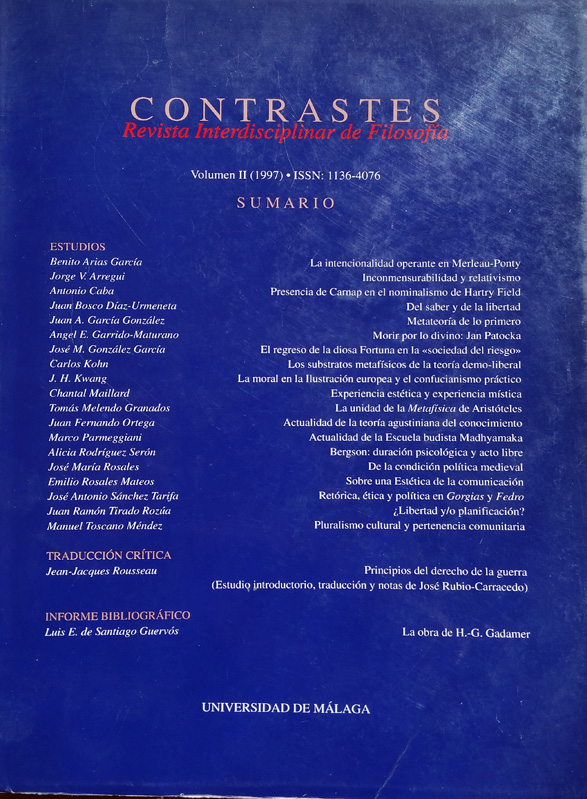Del saber y de la libertad. El argumento de isaiah Berlin contra el determinismo (I)
DOI:
https://doi.org/10.24310/Contrastescontrastes.v2i0.1747Abstract
RESUMEN
La posición de i.Berlin sobre el determinismo fue recibida por muchos como un ataque al alcance de las ciencias humanas. Su argumentación, sin embargo, sugiere nuevas y sugerentes relaciones entre el conocimiento y la libertad, además de una concepción específica de la lectura de la historia. En el presente ensayo, que constituye una primera parte del trabajo, se analiza el argumento de I. Berlin sobre el determinismo, situándolo en las dos discusiones sobre la historia que se desarrollaron tras la II Guerra Mundial.
PALABRAS CLAVE
DETERMINISMO-BERLIN
ABSTRACT
I. Berlin's position on determinism was received by many authors as an attack on the human sciences. His interpretation, however, suggests novel and stimulating relations between knowledge and freedom, together with a specific philosophy of history. This paper, wich constitutes the first part of a whole essay, assesses Berlin's argument on determinism, placing it within the two debates on history held after world war II.
KEYWORDS
DETERMINISM-BERLIN
Downloads
Metrics
Publication Facts
Reviewer profiles N/A
Author statements
Indexed in
-
—
- Academic society
- N/A
- Publisher
- Universidad de Málaga
Downloads
Published
How to Cite
Issue
Section
License
This journal provides immediate free access to its content under the principle of making research freely available to the public. All content published in Contrastes. Revista Internacional de Filosofía, are subject to the Creative Commons Attribution-NonCommercial-ShareAlike 4.0 license whose full text can be found at <http://creativecommons.org/licenses/by-nc-sa/4.0>
It is the responsibility of the authors to obtain the necessary permissions of the images that are subject to copyright.
Authors whose contributions are accepted for publication in this journal will retain the non-exclusive right to use their contributions for academic, research and educational purposes, including self-archiving or repository in open access repositories of any kind.
The electronic edition of this magazine is edited by the Editorial Service of the University of Malaga (Uma Editorial), being necessary to cite the origin in any partial or total reproduction.










5.png)
